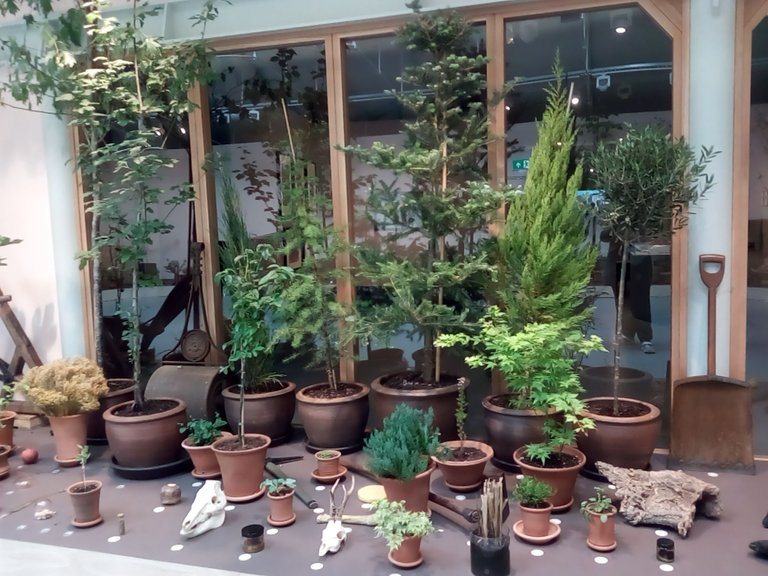
Part of the installation "Back to the Fields" by Ruth Ewan, 2015-2022, exhibited as part of Radical Landscapes at Tate Liverpool.
The display shows the month of "Frimaire/Frost".
Back to the Fields is based on the French Republican calendar in use from 1793-1805. The French Republican calendar is made up of twelve months of thirty days. Each month is divided into three weeks, each week is ten days long. The final five (or six) days of the year are festival days. The calendar stands in opposition to the Gregorian calendar and has no references to kings, emperors or gods. Each day is symbolised by a natural object - either animal, vegetable or mineral. (Radical Landscapes, Tate, 2022)
It is interesting to have this topic this week: last weekend I was in Liverpool to see the Radical Landscapes exhibition at the Tate Gallery. The exhibition is about many things: what our relationship is to the land and how we view it, who owns it and who has access to it:
We have a partial Right to Roam to a mere eight per cent of the land in the UK; over the other ninety-two percent, the laws of trespass still prevail. (Radical Landscapes, Tate, 2022)
The exhibition covers a wide range of historical, social and economic issues, including common people's (that's pretty much all of us) struggle to be in the land, to enjoy the land and nature, and to have some small part of it for ourselves to have a living.
It looks at land enclosures and the effects of industrialisation, the protests of the Diggers and Levellers, the mass trespasses that took place during the mid-20th Century and which led to the creation of the National Parks, the militarisation of the land, for example at Greenham Common, and the women activists who occupied the Peace Camp and staged non-violent actions in protest and resistance. It considers climate breakdown and the access of different groups of people to the land, including immigrants and disabled and LGBTQI+ people.
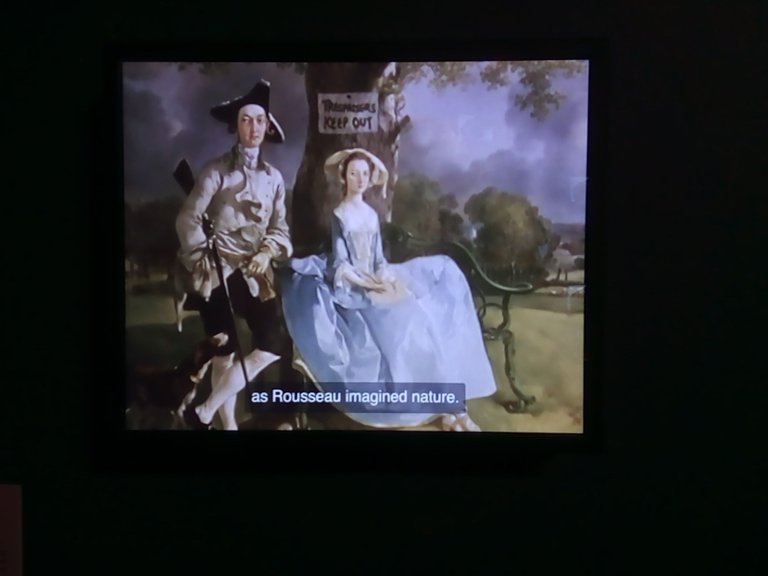
This is a still from a documentary by John Berger, Ways of Seeing shown on the BBC in 1972, showing a very famous painting of Mr and Mrs Andrews by Thomas Gainsborough, 1750. Berger has pinned the notice "Trespassers KEEP OUT" to the tree.
Berger interprets the painting as a celebration of property. 'Theirs is private land,' he writes. 'Their attitude towards it is visible [zoom in to the portrait in the National Gallery for the smug smirk on Mrs Andrews' chops]. If a man stole a potato at that time he risked a public whipping. The sentence for poaching was deportation. (Radical Landscapes, Tate, 2022)
Living a nomadic life and setting up camps was targeted as anti-social through the Criminal Justice and Public Order Act 1984, a precursor to legislation currently making its way through Parliament which criminalises Gypsy, Roma and Traveller communities for residing or intending to reside on land without the permission of the owner or occupier.
This begs the question: where and how could you live an off-grid life in England, what would it be like, would it be possible without owning your own land or property?
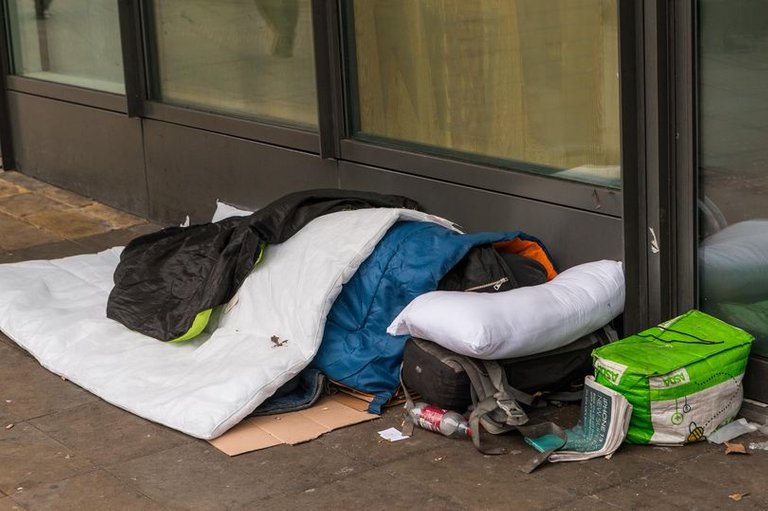
Source: Manchester Evening News Of course, there are many people living an off-grid life without any choice in the matter.
In December 2021, there were 6,780 homeless people in Manchester, eight times higher than anywhere else in the north west of England and 1:81 of the population. Across England, more than 274,000 people were homeless with an estimated 5,000 people sleeping rough, off-grid in the streets.
Much of this is a consequence of poverty, precarious employment, in work benefits and the challenges of Universal Credit (a good idea poorly executed), exacerbated by the strictures of the pandemic and now by energy prices and the rising cost of living. Our safety net has some yawning holes.
Over the years, I've followed the journey of Karl of this parish, as he investigated and reported on alternative and off grid communities on his way to buying some land in Portugal. The thing that most frequently struck me was what very hard work was involved, and the often tedious nature of the life. I always wondered what happened when you were sick and old, especially in one community where people appeared to live most of their life outdoors. There was no heating and no hot water, and a lot of time (eight hours a day) was spent weeding.
In the research that I did for this post I came across a blog post "Off Grid Living Mistakes" which kicks off with:
Have you always dreamed of escaping cubicle life and traffic jams, to live off the grid, independent and free? You know, being self-reliant, building cook fires with wood you chopped, or cooking on an old wood cook stove?
The writer is Canadian, so from a very different culture and land use to England, where pioneer in the Mountain Man sense has much more resonance, although I too remember being seduced by stories of Jedediah Smith in my teens. Jedediah Smith, dead at thirty-two, that should be a warning if nothing else is.
The blogger goes on to answer her own question:
I did. But in all my daydreams [my italics and emphasis], I didn't imagine that I would make a whole lot of off grid living mistakes.
And follows with five mistakes and how to avoid them:
- Didn't know enough about off grid power systems.
- Unrealistic idea of off grid homesteads.
- Underestimated off grid home costs.
- I wasn't physically strong enough.
- Didn't have a support network.
It's a good post that explores each of these problems in depth and then gives ideas about how you can research and prepare and take up weight training.
I can understand the mentality that leads to this. My parents were a tad anarchic (my grandmother reported that "they live like Gypsies" to the rest of the family on her return from a visit) and spent years dreaming of an off grid life, meanwhile reading John Seymour's Self Sufficiency from cover to cover. They did become fairly self sufficient food wise after moving back to the coastal town my father's family come from, living from the allotment and the sea. They never got round to keeping and slaughtering a pig, so meat was still brought in along with flour and alcohol.
They worked hard. My mum had a job and then went to the allotment after work. My dad walked to the bay twice a day after the tide to collect fish and crustaceans caught on the landline - often through the night and in all weathers - between working on the house, a two hundred year old coaching inn "in need of modernisation".
I have been pondering the relationship between minimalism and off grid living. Is there an idea that off grid living is a simpler life? How realistic and reasonable is it as a lifestyle in England where most of the population is urban and much of it is poor?
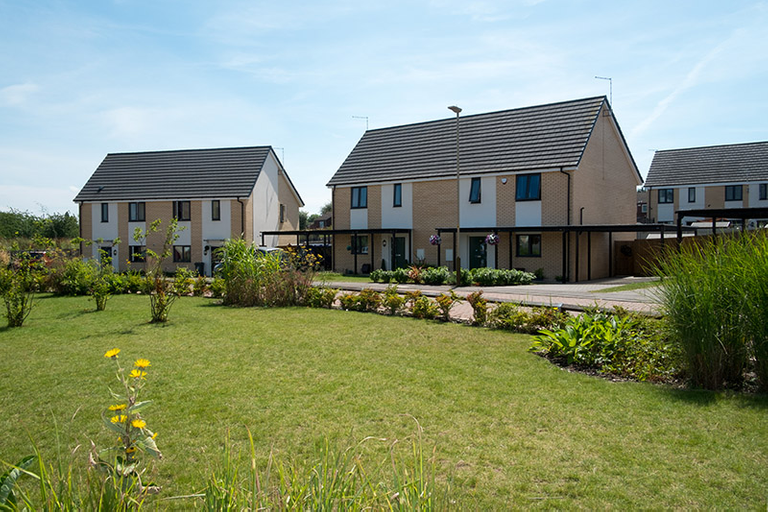
Source - Saffron Lane Neighbourhood Council Is there room for hybridisation? Passivhaus homes for example, like the eco houses built on Saffron Lane estate in Leicester, one of the ring of outer social housing estates that surround Leicester.
a spacious development of bright, highly insulated homes that were designed in the passiv-haus style as a way of cutting heating bills for the new residents. The homes themselves are a mix of 1, 2, 3 and 4 bedroomed properties – seven with wheelchair access. They are grouped around two greens and surrounding avenues, and have large gardens and parking spaces.
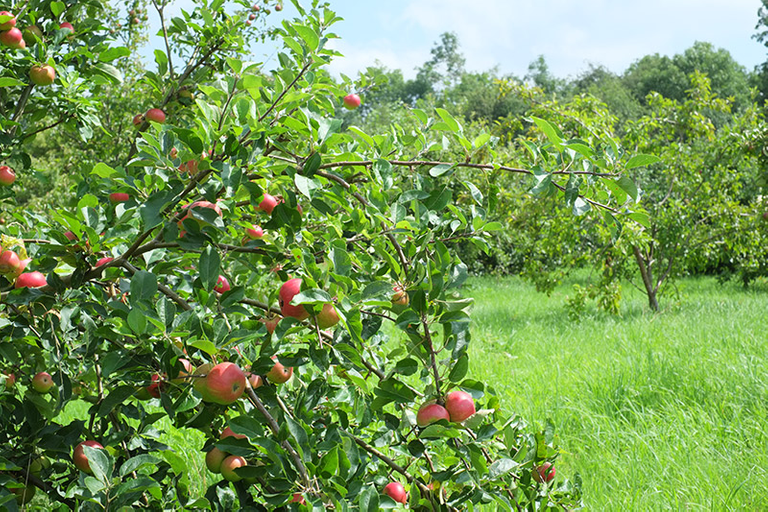
Source: Saffron Heath
The houses back onto Saffron Heath, a six acre site with numerous heritage features including unusual local varieties of fruit and nut trees, bee hives, a pre-Victorian field pond and an Anderson shelter.
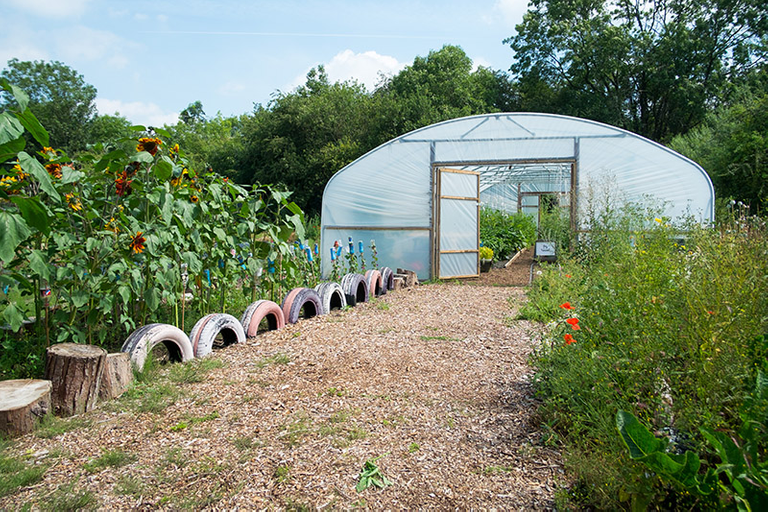
Source: Saffron Acres
Saffron Acres is an award-winning open space in the centre of the Saffron Lane estate, managed by Saffron Lane Neighbourhood Council for the benefit of local people. When we took it over in 2006, it was disused land, and we quickly set about revitalising it so that we could provide funded work placements and volunteering opportunities enabling local people to learn how to live more sustainably; growing and cooking their own produce, generating green energy, and living a healthier lifestyle ... The six acre site has full disabled access, including poly-tunnels, hand-wash station and composting toilet.
All the above developments were built on or reclaimed from, at the time, disused marginal land between the railway line and the arterial road leading to the centre of Leicester. There are plans to build another 100 eco-houses as part of a community led housing project.
I've written in a previous post about Saffron Acres where you'll find a video with Neil Hodgkin and his colleagues from Saffron Neighbourhood Council and the story of how Saffron Acres is growing people out of poverty.
Being, as I am, in the sick, lame and lazy club, off grid living is not for me, even if I had the personality for it. And I don't have the personality for it: riders when I go to stay with people have always been a bedside lamp, hot and cold running water and a flushing toilet.
That doesn't mean that there shouldn't be options for off grid living for people who want to live that kind of life. Creating that space requires us to challenge collectively the way land is owned, used and governed in England, to resist attempts to close off the land still further (two public rights of way are currently under dispute not two miles from where I live, with both under threat of being privatised and no longer available for common use) and to protest at the criminalisation of nomadic ways of life, even if they don't suit us.
More than that, living as we do in an urbanised, post-industrial, country in the throes of the fourth industrial revolution, we need to think about how:
to help everyone, including leaders, policy-makers and people from all income groups and nations, to harness converging technologies in order to create an inclusive, human-centred future. To look beyond technology, and find ways to give the greatest number of people the ability to positively impact their families, organisations and communities. (Source: World Economic Forum - although I'm not sure they should be our guiding light, mired as they are in the neoliberal project. Sometimes you have to take what you can get).
This is my response to The MINIMALIST Blogging Challenge Week 8 - you're welcome to join in.


Three things newbies should do in their first week and, for most things, forever afterwards!
HIVE UK MEET-UP: Saturday 18 June 2022 | 12.00-5.00pm | Halifax, West Yorkshire.


